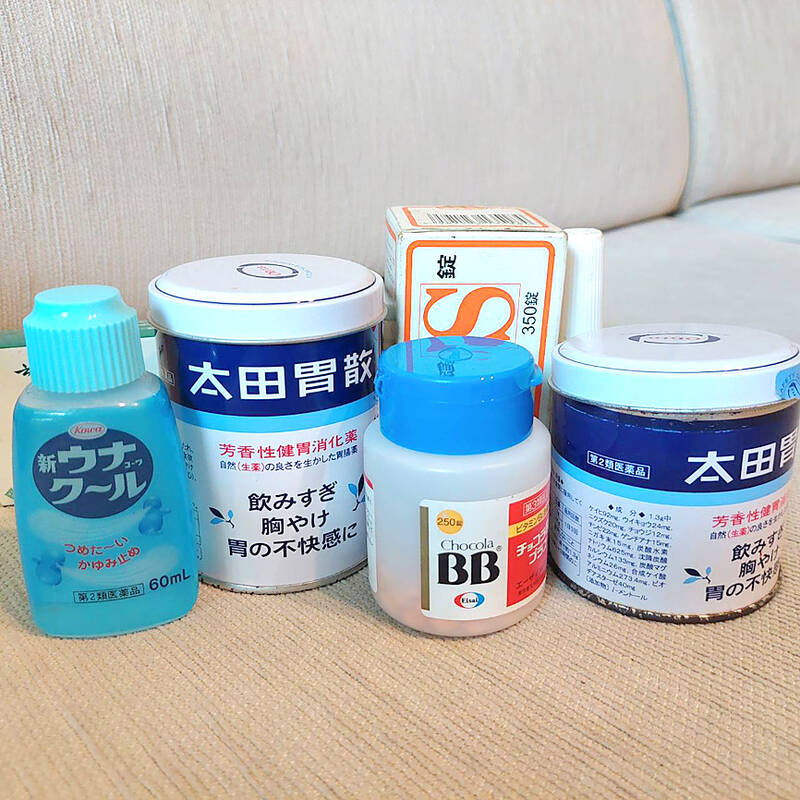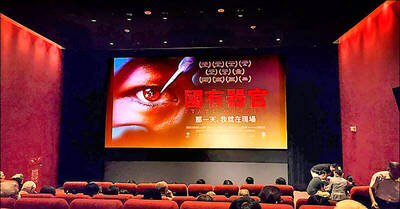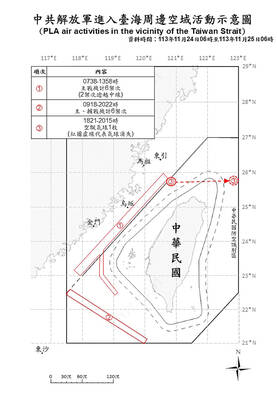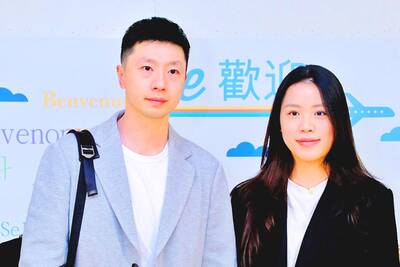Travelers returning from abroad may only bring 36 containers of medication or health supplements into Taiwan, health officials said on Saturday, as people prepare to travel overseas during the summer break.
The types of containers include bottles, packets and paper wrappers as stipulated by the Regulations Governing the Declaration, Inspection, Duty and Release of Personal Luggage or Goods of Inward Passengers, health officials said.
The weight limit for traditional herbal medicines is 12kg. The medication may not include more than 12 kinds of ingredients or plants.

Photo: Chang Hsieh-sheng, Taipei Times
“Taiwanese tend to buy souvenirs and pharmaceutical products when traveling abroad, usually cold medication, powders and pills for indigestion or stomach ache, painkillers, cough medicines, anti-itch creams and eye drops,” the Nantou County Public Health Bureau said in a statement.
“These are bought either for personal use or as gifts for family and friends,” it said.
Outbound travelers who are on medication need to take the prescription issued by a doctor, clinic or hospital with them, health officials said.
The amount of medicine they can carry on their person may not exceed the prescribed dosage, they said, adding that they may carry up to six months’ of medication.
When abroad, people should assess their personal needs when buying drugs or health supplements and should not buy them for friends or family, the officials said.
They should also refrain from buying too much to prevent waste, they said.
It is illegal to sell medication and health supplements brought from abroad, as they may only be brought in for personal use or for family members, the regulations stipulate. Offenders can face fines.
The officials cited the case of a naturalized Taiwanese citizen who recently brought back large amounts of pharmaceutical products from her former country and sold the unused items online.
She was fined NT$30,000 for contravening the Pharmaceutical Affairs Act (藥事法), the officials said.

Theaters and institutions in Taiwan have received 28 threatening e-mails, including bomb threats, since a documentary critical of China began being screened across the nation last month, the National Security Bureau said yesterday. The actions are part of China’s attempts to undermine Taiwan’s sovereignty, it said. State Organs (國有器官) documents allegations that Chinese government officials engage in organ harvesting and other illegal activities. From last month to Friday last week, 28 incidents have been reported of theaters or institutions receiving threats, including bomb and shooting threats, if they did not stop showing the documentary, the bureau said. Although the threats were not carried out,

‘GRAY ZONE’ TACTICS: China continues to build up its military capacity while regularly deploying jets and warships around Taiwan, with the latest balloon spotted on Sunday The US is drawing up contingency plans for military deployments in Japan and the Philippines in case of a Taiwan emergency, Japan’s Kyodo news agency reported. They would be incorporated in a first joint operation plan to be formulated in December, Kyodo reported late on Sunday, citing sources familiar with Japan-US relations. A US Marine Corps regiment that possesses High Mobility Artillery Rocket Systems — a light multiple rocket launcher — would be deployed along the Nansei Island chain stretching from Kyushu to Yonaguni near Taiwan, Kyodo said. According to US military guidelines for dispatching marines in small formations to several locations,

As Taiwan celebrated its baseball team’s victory in the World Baseball Softball Confederation’s Premier12 on Sunday, how politicians referred to the team in their congratulatory messages reflected the nation’s political divide. Taiwan, competing under the name Chinese Taipei (中華台北隊), made history with its first-ever Premier12 championship after beating Japan 4-0 at the Tokyo Dome. Right after the game, President William Lai (賴清德) congratulated the team via a post on his Facebook page. Besides the players, Lai also lauded the team’s coaching and medical staff, and the fans cheering for them in Tokyo or watching the live broadcast, saying that “every

The Mainland Affairs Council (MAC) yesterday confirmed that Chinese students visiting Taiwan at the invitation of the Ma Ying-jeou Foundation were almost all affiliated with the Chinese Communist Party (CCP). During yesterday’s meeting convened by the legislature’s Foreign Affairs and National Defense Committee, Democratic Progressive Party (DPP) Legislator Michelle Lin (林楚茵) asked whether the visit was a way to spread China’s so-called “united front” rhetoric, to which MAC Deputy Ministry Shen You-chung (沈有忠) responded with the CCP comment. The MAC noticed that the Chinese individuals visiting Taiwan, including those in sports, education, or religion, have had increasingly impressive backgrounds, demonstrating that the